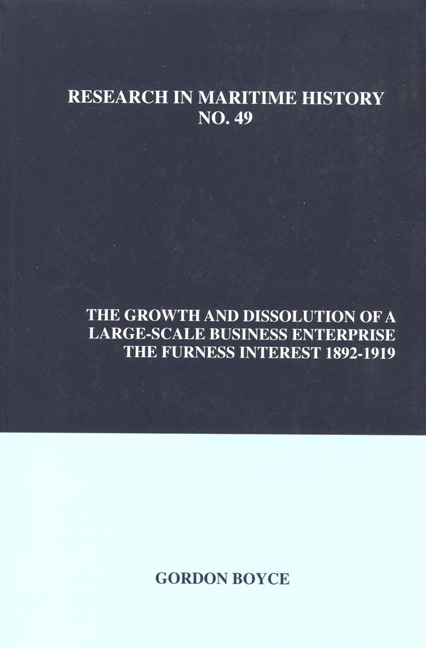Book contents
- Frontmatter
- Table of Contents
- About the Author
- Acknowledgements
- Figures and Tables
- Introduction
- Chapter 1 Furness' Shipping Services: Growth by Organic Means in the 1880s
- Chapter 2 The 1890s: Furness Withy's Expansion by Acquisition and Promotion
- Chapter 3 Diversification into the Industrial Sector, 1895-1901
- Chapter 4 Trouble on the Transatlantic Route: The Formation of the IMM and Furness' Response
- Chapter 5 The Growth of Shipping Services, 1902-1909
- Chapter 6 Industrial Operations and Performance, 1900-1914
- Chapter 7 The Growth of the Shipping Interests, 1910-1919
- Chapter 8 Structure
- Chapter 9 Finance
- Chapter 10 Holding Company Investment Activities and Intermediary Operations
- Chapter 11 Personnel
- Chapter 12 Furness
- Chapter 13 Dissolution
- Appendix 1 Development of the Combined Fleet, 1900-1919
- Appendix 2a Patterns of Ownership: The Furness Group, 1919
- Appendix 2b Reorganization of Branch Offices and Superintending Departments, 1911-1912
- Appendix 3a Fluctuations in Freights, Profits, Tonnage Afloat and Merchant Shipping Output
- Appendix 3b Output of Merchant Tonnage (Excluding Warships), 1892-1913
- Appendix 3c Fluctuations in the Price of a 7500-ton Cargo Steamer, 1898-1913
- Appendix 4 Development of the Furness Group: Principal Promotions, Acquisitions and Divestments, 1880-1919
- Appendix 5 Northern Allies and Maritime Associates
- Appendix 6 Contemporary Accounting Law and Conventions, 1845-1914
- Appendix 7 Lord Furness' Movements, 1899-1912
- Bibliography
Chapter 9 - Finance
- Frontmatter
- Table of Contents
- About the Author
- Acknowledgements
- Figures and Tables
- Introduction
- Chapter 1 Furness' Shipping Services: Growth by Organic Means in the 1880s
- Chapter 2 The 1890s: Furness Withy's Expansion by Acquisition and Promotion
- Chapter 3 Diversification into the Industrial Sector, 1895-1901
- Chapter 4 Trouble on the Transatlantic Route: The Formation of the IMM and Furness' Response
- Chapter 5 The Growth of Shipping Services, 1902-1909
- Chapter 6 Industrial Operations and Performance, 1900-1914
- Chapter 7 The Growth of the Shipping Interests, 1910-1919
- Chapter 8 Structure
- Chapter 9 Finance
- Chapter 10 Holding Company Investment Activities and Intermediary Operations
- Chapter 11 Personnel
- Chapter 12 Furness
- Chapter 13 Dissolution
- Appendix 1 Development of the Combined Fleet, 1900-1919
- Appendix 2a Patterns of Ownership: The Furness Group, 1919
- Appendix 2b Reorganization of Branch Offices and Superintending Departments, 1911-1912
- Appendix 3a Fluctuations in Freights, Profits, Tonnage Afloat and Merchant Shipping Output
- Appendix 3b Output of Merchant Tonnage (Excluding Warships), 1892-1913
- Appendix 3c Fluctuations in the Price of a 7500-ton Cargo Steamer, 1898-1913
- Appendix 4 Development of the Furness Group: Principal Promotions, Acquisitions and Divestments, 1880-1919
- Appendix 5 Northern Allies and Maritime Associates
- Appendix 6 Contemporary Accounting Law and Conventions, 1845-1914
- Appendix 7 Lord Furness' Movements, 1899-1912
- Bibliography
Summary
The financial history of Furness Withy provides insights into the policies and performance of a dynamic firm during a period of significant change in corporate size and organization. Between 1891 and 1919, the supporting legalfinancial context in which British business operated also underwent meaningful, but not radical, modification. New legislation provided entrepreneurs with opportunities to raise funds from a wider range of sources, but constraints in the form of investor expectations and social conventions influenced evolving financial structures. Within British capital markets, traditional sources of private wealth and “corporate” providers - suppliers and non-aligned businesses - continued to provide facilities, but investors displayed a steady appetite for shares and debt instruments while banks became more accommodating.
Yet whether the degree of institutional change in financial markets was sufficient to preserve Britain's overall international competitiveness is subject to debate. Historians who believe that the nation entered a period of relative decline have sought the underlying causes in a number of directions, including technical inventiveness, entrepreneurial drive, corporate and industrial structures, ownership forms and financial institutions. Some of these elements are linked, of course, but two related areas of persistent disputation will be examined here: capital-market performance and family-based business.
Concern for the performance of Britain's capital markets has focused on supply and demand factors. For the former, several commentators argue that the flow of funds was not impeded but that industry could draw on an array of specialized providers. Others believe that defects in information channels hindered investment. William Kennedy suggested that after the financial crisis of the 1870s, banks curtailed long-term lending, leaving equity markets as the chief external source of funds. Yet because company law did not re quire firms to provide sufficiently accurate information, investors withheld support and showed a preference for foreign portfolio investments. As a result, industry was deprived of capital at a time of salient technical and organizational change. Michael Best and Jane Humphries argue that industry was disadvantaged because British banks did not the follow the continental example of developing formal communication channels based on ownership stakes and Board ties to sustain long-term investment strategies.
On the demand side, several scholars argue that businessmen safeguarded information to protect their control and thus accepted lower profits.
- Type
- Chapter
- Information
- The Growth and Dissolution of a Large-Scale Business EnterpriseThe Furness Interest, 1892-1919, pp. 249 - 284Publisher: Liverpool University PressPrint publication year: 2012

